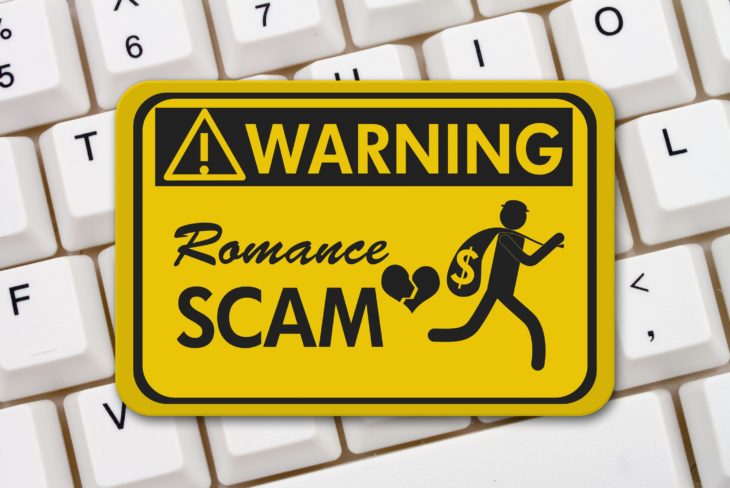Everyone deserves to find love! But today’s fast-moving world, many of us are finding it increasingly difficult to find a partner. As a society, we’re working longer hours than ever, and the search for romance often gets left on the back burner. Luckily, online dating now offers a convenient way of increasing relationship prospects for busy people, and more and more of us are using them to find romance. Unfortunately, dating websites and apps also offer the perfect opportunity for romance scammers to try to deceive money from website users.
An FBI report shows that confidence and romance scams are the second most costly type of fraud, with losses adding up to a staggering $500m. The sums lost can involve people’s entire life savings: one Canadian victim was defrauded of over CA$730,000.
Contents
How to spot the red flags

Source: dailymail
In this article, we’re taking a look at some of the red flags that your online love interest might be trying to find a way into your bank account rather than your affections.
Are their pictures too good to be true?
Be wary of profile pictures that look as if a professional photographer might have taken them. Most people using dating websites legitimately will either upload a selfie or use shots taken by family or friends. Their pics aren’t likely to have been photoshopped or have the perfect lighting effect seen in professional images. If you’re suspicious that an image might not be genuine, save and upload it. You can then ask Google to search for it and discover if it appears anywhere else online.
They ask you in-depth questions
Scammers will tend to ask very personal and profound questions. They are pretending to be interested in you. They might want to know about all your past relationships, your aspirations in life, what you will do when you retire, and where you would love to travel to. While asking these types of questions is excellent for a normal couple getting to know each other, do make sure you’re not disclosing details of yourself that the scammer could use against you. It would help if you never gave your full name, your location details (including your workplace) to people online.

Source: wired
Coming on too strong, too soon
If a new contract says that you are their true soul mate and declares their undying love for you after just a few conversations, alarm bells should be ringing. Fraudsters will try to move the relationship forward as quickly as they can so that they can achieve their ultimate goal – your bank account. Our advice? Block the contact and report the person’s profile to the moderators of the dating app.
Wanting to move the conversation to another platform
Because dating apps and websites have various ways of detecting fraudsters, romance scammers will often quickly try to move the conversation to a different platform, such as your mobile phone or email. This is a real red flag – you should never share personal information so early in a relationship with someone about whom you know next to nothing. If your new love interest suddenly starts to get too pushy and demanding or doesn’t respect your preferences, it might be because they suspect that the dating app might have been alerted to their activities and will suspend their account.

Source: moneycrashers
Never able to meet in person
While getting to know someone online is an essential first step in building a new relationship, the ultimate goal is to find someone to spend time with in real life. If you’ve tried to arrange meet-ups but your date repeatedly cancels or fails to turn up, be wary. This is often a sign that your online contact is a romance scammer. Set yourself a very low limit for how many no-shows and excuses you will tolerate before blocking the contact and moving on.
Sob stories about financial struggles
If your new love interest starts talking about their financial struggles, especially if this is before you have met up, your suspicions should be aroused immediately. They might start by asking for a small amount, for a car repair, for example. If you agree to this, they will soon be asking for more.
A typical sob story might be a request for money for medical treatments for a family member. While they might have spent weeks or even months telling you that they’ve fallen in love with you, never send any money or give potential access to any of your financial details. Many victims have lost their life savings because of similar scams.
A few more words of warning from Huff Post Author, Lucy Clarke: “Scammers usually prey on the seemingly vulnerable. Those who have been divorced or widowed may be an ideal target for a scammer.”

Source: todayville
The tip of the iceberg
According to a report published by the FTC, the annual number of victims of romance scams is on the rise, growing from 8,500 to 21,000 between 2015-2018. And this is almost certainly just the tip of the iceberg. Many victims are too embarrassed to come forward and report the scammers.
Finally, never let your heart rule your head
A last piece of advice from welovedates.com: “Don’t let your heart rule your head. In the heady early days of a relationship, it’s all too easy to be swept away by your emotions. Online dating is a convenient, easy and enjoyable way to meet a new partner, but you should also bear in mind that it can expose you to fraudsters who are only interested in your money. Invest your time into finding a reputable dating site that has a team dedicated to weeding out scammers, and your experience of online dating will be a much safer one.”
While dating online, listen to your instincts, and do your research so that romance scammers won’t be able to waste your time, break your heart, or steal your savings.
